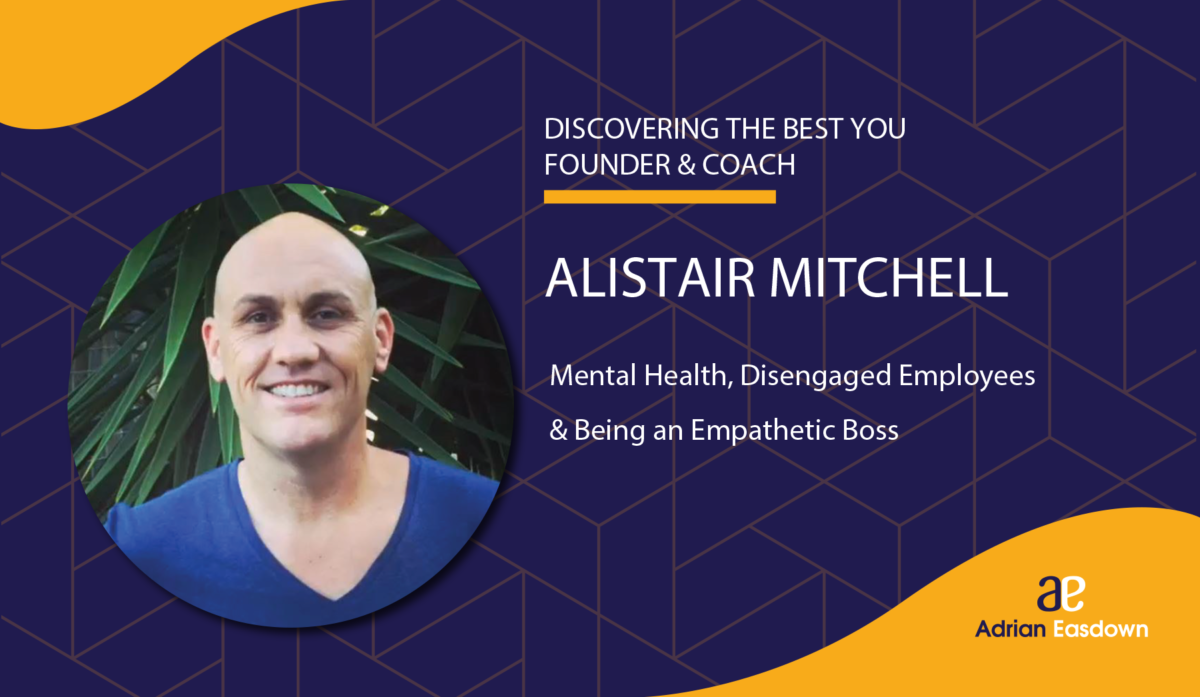Alistair Mitchell is a Mental Health advocate, Performance Coach and Founder of Discovering the Best You. After years growing up on the land, Alistair Mitchell moved to the Gold Coast and took on a Real Estate business. He was a competitive, country kid. A high achiever, especially when it came to sport. Unfortunately, the qualities Alistair developed in his younger years worked against him when he moved to the city and started a new business. The Real Estate industry was tough and Alistair struggled to keep up. He found himself relying on bad crutches and behaviours to cope. Overtime his health started to deteriorate and eventually his business and marriage broke down.
In this week’s episode of ‘That Bad Review’ podcast series, I chat with Alistair about how he worked through this extremely difficult period in his life and how it led to Alistair becoming a mental health advocate, speaker and health, wellbeing and performance coach.
Mental Health
Alistair is very open about his struggle with mental health. He talks candidly about being addicted to drugs and alcohol, self-medicating to get through the low points of his life. He talks about his marriage break down and the failure of his business. Alistair also shares how he broke through this dark period and slowly began building his life again. Through sharing his journey with others, Alistair realised that often in sport and business, the mental health of players and employees is not considered. The focus is often on being there to do a job, and that is it. Alistair explains how businesses, organisations and individuals need to understand that everyone is different and the workplace should not be a ‘one size fits all’ environment. He explains that everyone needs to be shown respect, empathy and understanding, especially when going through a tough time.
Disengaged Employees
Alistair shares that an employer’s lack of understanding or perhaps even a lack of willingness to take the mental health of employees seriously, not only effects the wellbeing of the individual, but can also have dire consequences on the bottom line of a business. Figures released recently indicate that mental health issues at work is costing Australia approximately 18 billion dollars a year. Alistair explains the impact of mental health on productivity and shares some great tips around work place culture and supporting staff in creating healthy habits and routines to combat mental health. Alistair explains that for every dollar a business spends on addressing mental health issues, they receive approximately $2.30 back in profitability.
Being an Empathetic Boss
Alistair explains that employers can’t expect people to just switch off and leave their home life behind when they get to work. It doesn’t work like that anymore. Employers need to be empathetic to the needs of staff and really try to notice when employees are acting out of character. When this happens, employers should approach the person and say something along the lines of ‘I’ve noticed that you having been a bit out of sorts recently, like you’re feeling a bit flat, is there anything I can do?’ Simple words like this shows a true level of care, and increases the level of endorphins in the other person.
To be empathetic, an employee needs to be able to ‘walk in someone else’s shoes’. Alistair explains that an empathetic boss will always bring the best out in employees. He provides some great tips for addressing mental health in the workplace. Alistair also shares information about his business ‘Discovering the Best You,’ which offers programs and presentations designed to tackle mental health in schools, businesses and sporting organisations. ‘Discovering the Best You’, provides the tools and skills necessary to support students, employees and players, at school, work or in everyday life.
Also, in this week’s podcast episode
In this episode Alistair and I discuss:
- Alistair’s battle with mental illness
- How Alistair draws on his experience to help others
- Learning to trust gut instincts
- The role of medical professionals and helplines in mental health
- The positive effects of exercise, mindfulness, meditation, good nutrition, and creating routine on mental health
- Habilitation verses rehabilitation
- Work place wellbeing programs
- The effect of happy staff on customers
- More than just asking people ‘Are you OK?’
- Having the right tools to tackle mental health in the workplace
- Creating a positive working environment
- Team building opportunities
- Leading by example
- Wellbeing officers in the workplace
- The importance of clearing emotional baggage
- Learning through failure
- The importance of connecting with others

